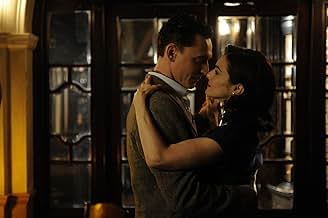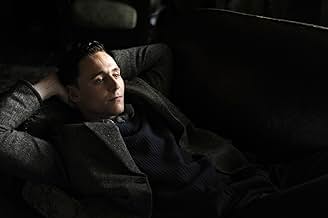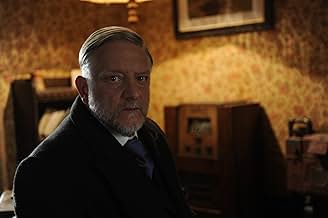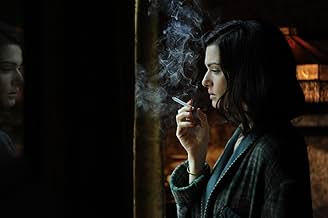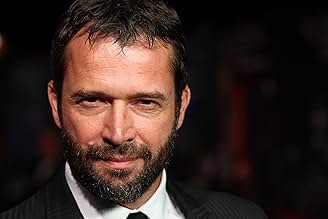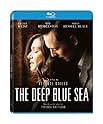AVALIAÇÃO DA IMDb
6,2/10
17 mil
SUA AVALIAÇÃO
A esposa de um juiz britânico é pega em um caso de amor autodestrutivo com um piloto da Força Aérea Real.A esposa de um juiz britânico é pega em um caso de amor autodestrutivo com um piloto da Força Aérea Real.A esposa de um juiz britânico é pega em um caso de amor autodestrutivo com um piloto da Força Aérea Real.
- Direção
- Roteiristas
- Artistas
- Prêmios
- 5 vitórias e 13 indicações no total
Jorge Ojeda-Dávila
- Man in Bunker Bed
- (não creditado)
Owen Thomas
- Caretaker
- (não creditado)
- Direção
- Roteiristas
- Elenco e equipe completos
- Produção, bilheteria e muito mais no IMDbPro
Avaliações em destaque
Yes, the film is depressing. Yes, it is very long (or it feels rather longer than it is). But, it is good. After viewing it, I couldn't get it out of my mind. It's utterly haunting. There are many things that were less than great in this film. But I've narrowed it down to 1: The Pacing. If this one flaw were corrected, it would have made an excellent film. But, rather than focusing on the negative, I will write about the positive aspects of this particular movie. First, the cinematography is excellent. Those ultra-saturated colors serve the film and the period which it represents very well. I've covered the editing (in the negative) but I will say that there were some surprisingly beautiful camera movements in the piece, that were noticeable, yet served the mood of the story very well. However, if you ever see this film, I would recommend it for the wonderfully subtle performance of Rachel Weisz, who has grown into one of the best actors of her generation. Everything you need to know about the way her character is feeling is not always in the dialogue, but on her mesmerizing face. Weisz makes you not necessarily relate (it is, almost always un-relatable, because of the period and the character that she is playing), but she does make you care. There is no question that this is not a film for everyone. It is slow, it is internal, but it is also worth giving it a try. I moaned and complained all the way through, but in the end, I was unable to stop thinking about it. And, that alone is a testament to its power. It slowly gets under your skin, and you won't even notice it!
This film is recommended.
Based on Terence Rattigan's 1952 play, The Deep Blue Sea is stylish soap opera at its best, and an overly ripe melodramatic downer at its worst. The film is reminiscent of the type of films that were popular fare in the fifties. ( And please, don't confuse it with the similarly titled shark attack movie some years back. ) No blood is spilled in this movie adaptation, but many lives are destroyed as loss and suffering does take its toll.
It is post-war Britain. Ruins are everywhere, from the bombed-out buildings to the people who inhabit them. There is a drabness in their hopeless lives, their colorless clothes, and their everyday routines. One such person is Hester Collyer, an unhappy romantic soul, trapped in a comfortable but loveless marriage to Sir William, a wealthy judge. Of course this means only one thing: suicide or an affair is in the offing. Fortunately ( or unfortunately, as the case may be ) after she meets a dashing but lonely RAF pilot named Freddie, there is a temporary respite from her real world. Lust, sin, and passion become the missing strands to her unraveling world ( which is not too surprising when one sees Hester's blatant scarlet red coat that overtly signals a Prynne moment is upon us. No subtlety lost here. Code Red, or is that Coat Read? )
This period melodrama is terribly British with a capital B. All proper diction, words unsaid, and formal reserve. Everyone is so noble and refined. Writer / director Terence Davies evokes the right atmospheric mood as we become lost in Hester's memories. He has a fine visual eye for those bittersweet times and Davies sensitively recalls the aftermath of WWII most efficiently with his use of popular and classical music and strong imagery, especially the impressive Underground bomb shelter scene. After an overly slow beginning, the director paces his film quite well using sounds, silences, and pauses in the characters' reactions to their conversations most effectively in telling his tale of a love undone.
The film sporadically uses these moments to tell the story of the makings of a passionate love affair, but its fragmented structure never allows us to understand Hester's attraction and her rationale to her self-proclaimed changes in her life. She's portrayed as a sympathetic victim, yet this character chooses the very unhappy lifestyle that she now wallows in, and we moviegoers are unable to see the results of her actions. It's as if some parts to her past are missing and sketchy, especially the happier times.
As the damaged Hester, Rachel Weisz is quite smashing. This talented actress fills her slightly underdeveloped role with such clarity and depth. ( Her scene in the pub as she stares into her lover's eyes while becoming uninvolved with the rowdy goings-on during the sing- along of a Jo Stafford tune says more than mere words could have expressed. ) It is a powerful nuanced performance. Completing the love triangle is Simon Russell Beale as her concerned husband and Tom Hiddleston as her cad of a lover. Both actors create indelible contrasting personalities, although the character of Freddie comes off the worst of the pair. Solid support from Ann Mitchell as Hester's landlady and Barbara Jefford is Hester's judgmental mother-in-law round out this wonderful ensemble.
The Deep Blue Sea is a successful throwback to the the great David Lean film, Brief Encounter. Only this time, the encounter is not brief and fleeting, just fleeting. It takes the moviegoer back to a former time, unlike today, when movies had a heart and mind, and dare I say, soul. GRADE: B
NOTE: Visit my movie blog for more reviews: www.dearmoviegoer.com
Based on Terence Rattigan's 1952 play, The Deep Blue Sea is stylish soap opera at its best, and an overly ripe melodramatic downer at its worst. The film is reminiscent of the type of films that were popular fare in the fifties. ( And please, don't confuse it with the similarly titled shark attack movie some years back. ) No blood is spilled in this movie adaptation, but many lives are destroyed as loss and suffering does take its toll.
It is post-war Britain. Ruins are everywhere, from the bombed-out buildings to the people who inhabit them. There is a drabness in their hopeless lives, their colorless clothes, and their everyday routines. One such person is Hester Collyer, an unhappy romantic soul, trapped in a comfortable but loveless marriage to Sir William, a wealthy judge. Of course this means only one thing: suicide or an affair is in the offing. Fortunately ( or unfortunately, as the case may be ) after she meets a dashing but lonely RAF pilot named Freddie, there is a temporary respite from her real world. Lust, sin, and passion become the missing strands to her unraveling world ( which is not too surprising when one sees Hester's blatant scarlet red coat that overtly signals a Prynne moment is upon us. No subtlety lost here. Code Red, or is that Coat Read? )
This period melodrama is terribly British with a capital B. All proper diction, words unsaid, and formal reserve. Everyone is so noble and refined. Writer / director Terence Davies evokes the right atmospheric mood as we become lost in Hester's memories. He has a fine visual eye for those bittersweet times and Davies sensitively recalls the aftermath of WWII most efficiently with his use of popular and classical music and strong imagery, especially the impressive Underground bomb shelter scene. After an overly slow beginning, the director paces his film quite well using sounds, silences, and pauses in the characters' reactions to their conversations most effectively in telling his tale of a love undone.
The film sporadically uses these moments to tell the story of the makings of a passionate love affair, but its fragmented structure never allows us to understand Hester's attraction and her rationale to her self-proclaimed changes in her life. She's portrayed as a sympathetic victim, yet this character chooses the very unhappy lifestyle that she now wallows in, and we moviegoers are unable to see the results of her actions. It's as if some parts to her past are missing and sketchy, especially the happier times.
As the damaged Hester, Rachel Weisz is quite smashing. This talented actress fills her slightly underdeveloped role with such clarity and depth. ( Her scene in the pub as she stares into her lover's eyes while becoming uninvolved with the rowdy goings-on during the sing- along of a Jo Stafford tune says more than mere words could have expressed. ) It is a powerful nuanced performance. Completing the love triangle is Simon Russell Beale as her concerned husband and Tom Hiddleston as her cad of a lover. Both actors create indelible contrasting personalities, although the character of Freddie comes off the worst of the pair. Solid support from Ann Mitchell as Hester's landlady and Barbara Jefford is Hester's judgmental mother-in-law round out this wonderful ensemble.
The Deep Blue Sea is a successful throwback to the the great David Lean film, Brief Encounter. Only this time, the encounter is not brief and fleeting, just fleeting. It takes the moviegoer back to a former time, unlike today, when movies had a heart and mind, and dare I say, soul. GRADE: B
NOTE: Visit my movie blog for more reviews: www.dearmoviegoer.com
Overindulgent and somewhat stuffy romantic drama that is saved single handedly by the Oscar caliber performance of Rachel Weisz, who gives a very complex and realistic look at a women whose self destructing over her choices in life in post war Britain in the 1950's. Weisz so good that she brings a lot of life into a somewhat lifeless screenplay that is more into atmosphere than substance. Both of her leading men are fine and lent great support to the vibrant Weisz, who is keeping this film afloat almost by herself while the movie gets a bit claustrophobic towards its climax. The film does have some great moments ( The pub scene and the intimate moment between Weisz and leading man Tom Hiddleston while dancing) but that's more the credit to Weisz and the cast than the film itself. Rachel Weisz has always been one of the most gifted and versatile actresses working today, not being afraid to do different characters and being unlikeable and raw in the process. In this film, she gives in my opinion the best female acting performance in the last few years, giving a complex and rich performance with a character that could have easily been botch by even a great actress, especially with a screenplay that is more into itself than the audience watching the movie. Weisz proves in this movie that she's more than a great actress, she proves that she is one of the best actresses we ever had.
Her phenomenal performance alone is the real reason to see this movie.
Her phenomenal performance alone is the real reason to see this movie.
The Deep Blue Sea is a period romance focusing on Hester (Rachel Weisz), the wife of a judge who embarks on an affair with the reckless RAF pilot Freddie (Tom Hiddleston). However, overcome with a mixture of guilt and disappointment that her new life isn't quite what she'd hoped, she makes a dramatic decision which has disastrous consequences for herself and her relationships.
This film has quite a poignant story – it focuses a lot on emotion and doubt which are highly relatable even outwith the situation of the story itself. The period setting gives it a somehow more romantic edge and it really is an interesting love story. You can't help but understand the problems that Hester experiences with her troubled life, and the "grass is greener" feeling that draws her towards a seemingly more exciting life with Freddie. The story ebbs and flows in parallel with Hester's feelings, and at times takes some dark turns. Despite the story being good, I felt really let down by the direction – the scenes constantly switch between present day and very recent flashbacks with little discerning detail as to which is which. I found myself lost at many points during the film, unable to work out where it was in the story and having to rely on the odd bit of choice dialogue that would reveal the time setting. This is sadly very off-putting and took away from the punch that the script would have had otherwise.
Despite the scene confusions, Weisz and Hiddleston offer a beautiful, if difficult, romance that is really set alive by the strengths of them as actors. Weisz is on top form with a powerful but vulnerable performance, and Hiddleston suits the role of the troubled romantic (his character in this reminded me a lot of his role in "Only Lovers Left Alive" (2014) in which he was incredible). There was also good performances from smaller characters, most notably Hester's husband Sir William (Simon Russell Beale) who's role was vulnerable and gentle, an opposite to the rival of his wife's affections.
The Deep Blue Sea is quite a powerful and interesting love story, but sadly I felt that the possibility of this film being a great classic romance was tarnished somewhat by the lack of clarity in time shifts. Nevertheless, the story is good and it's worth a watch for the excellent characters and script.
This film has quite a poignant story – it focuses a lot on emotion and doubt which are highly relatable even outwith the situation of the story itself. The period setting gives it a somehow more romantic edge and it really is an interesting love story. You can't help but understand the problems that Hester experiences with her troubled life, and the "grass is greener" feeling that draws her towards a seemingly more exciting life with Freddie. The story ebbs and flows in parallel with Hester's feelings, and at times takes some dark turns. Despite the story being good, I felt really let down by the direction – the scenes constantly switch between present day and very recent flashbacks with little discerning detail as to which is which. I found myself lost at many points during the film, unable to work out where it was in the story and having to rely on the odd bit of choice dialogue that would reveal the time setting. This is sadly very off-putting and took away from the punch that the script would have had otherwise.
Despite the scene confusions, Weisz and Hiddleston offer a beautiful, if difficult, romance that is really set alive by the strengths of them as actors. Weisz is on top form with a powerful but vulnerable performance, and Hiddleston suits the role of the troubled romantic (his character in this reminded me a lot of his role in "Only Lovers Left Alive" (2014) in which he was incredible). There was also good performances from smaller characters, most notably Hester's husband Sir William (Simon Russell Beale) who's role was vulnerable and gentle, an opposite to the rival of his wife's affections.
The Deep Blue Sea is quite a powerful and interesting love story, but sadly I felt that the possibility of this film being a great classic romance was tarnished somewhat by the lack of clarity in time shifts. Nevertheless, the story is good and it's worth a watch for the excellent characters and script.
"Love, that's all." (Hester responds to her husband when he asks her what happened.)
No film in recent memory is as depressing as The Deep Blue Sea, Terence Davies' adaptation of Terence Rattigan's play. In either venue, the story of Lady Hester Collyer (Rachel Weisz) and her infidelity will sear your brain in recognition of the perfect storm of love and lust sung to the tune of 1950's conservatism, which largely meant staying with a spouse regardless if it's a loveless marriage.
Freddie (Tom Hiddleston), a WWII Brit flyboy, hasn't graduated yet from the romance of that war to the responsibilities of true love in civilian life. Hester unfortunately is ripe for romance with him as her older husband, a high court judge and a peer, is caring but far too reserved to provide a tender woman with the love she needs.
This is a simple film of measured speech in the tradition of West End thespian greatness. Unlike the orderly upper class, love is not simple but rather messy. In the claustrophobia of her apartments, either beautifully appointed with Sir William Collyer (Simon Russell Beale) or bare with Freddie, Hester is always waiting, either for her husband to love her or her lover to stay with her. Ironically Sir William is waiting, too, with love taking its measure of despair from those who love. As for charming Freddie, he is exuberant, careless, and destructfully self-centered.
Davies and Rattigan intercut between times to make The Deep Blue Sea seem just that: fragmented and deeply melancholic. Yet despite the incoherence, you'll not see a better acting trio this year. Where the play lacks vibrancy or heart, the actors give it their best.
When Freddie consoles Hester upon leaving her with this cliché, "Never too late to start again, isn't that what they say?" he is also hitting the center of her tragedy—she is so passive that this may be the first and last adventure she will ever have.
All that's left is the estranging deep blue sea:
Who ordered that their longing's fire Should be as soon as kindled, cooled?
Who renders vain their deep desire?
A God, a God their severance ruled!
And bade betwixt their shores to be The unplumbed salt, estranging sea.
Matthew Arnold, "To Marguerite—Continued"
No film in recent memory is as depressing as The Deep Blue Sea, Terence Davies' adaptation of Terence Rattigan's play. In either venue, the story of Lady Hester Collyer (Rachel Weisz) and her infidelity will sear your brain in recognition of the perfect storm of love and lust sung to the tune of 1950's conservatism, which largely meant staying with a spouse regardless if it's a loveless marriage.
Freddie (Tom Hiddleston), a WWII Brit flyboy, hasn't graduated yet from the romance of that war to the responsibilities of true love in civilian life. Hester unfortunately is ripe for romance with him as her older husband, a high court judge and a peer, is caring but far too reserved to provide a tender woman with the love she needs.
This is a simple film of measured speech in the tradition of West End thespian greatness. Unlike the orderly upper class, love is not simple but rather messy. In the claustrophobia of her apartments, either beautifully appointed with Sir William Collyer (Simon Russell Beale) or bare with Freddie, Hester is always waiting, either for her husband to love her or her lover to stay with her. Ironically Sir William is waiting, too, with love taking its measure of despair from those who love. As for charming Freddie, he is exuberant, careless, and destructfully self-centered.
Davies and Rattigan intercut between times to make The Deep Blue Sea seem just that: fragmented and deeply melancholic. Yet despite the incoherence, you'll not see a better acting trio this year. Where the play lacks vibrancy or heart, the actors give it their best.
When Freddie consoles Hester upon leaving her with this cliché, "Never too late to start again, isn't that what they say?" he is also hitting the center of her tragedy—she is so passive that this may be the first and last adventure she will ever have.
All that's left is the estranging deep blue sea:
Who ordered that their longing's fire Should be as soon as kindled, cooled?
Who renders vain their deep desire?
A God, a God their severance ruled!
And bade betwixt their shores to be The unplumbed salt, estranging sea.
Matthew Arnold, "To Marguerite—Continued"
Você sabia?
- CuriosidadesTerence Davies wanted Rachel Weisz for the part of Hester Collyer after he noticed her "incredible talent" in Trazido pelo Mar (1997), even though he hadn't heard of her before seeing that film. He called his agent and asked, "Have you ever heard of this girl Rachel Weisz?" His agent laughed and said, "She's an Oscar winner!" Weisz was amused by this and said, "I don't think Terence [Davies] knows very well anyone who's not in a black and white film."
- Citações
Freddie Page: Let me give you a case: Jack loves Jill, Jill loves Jack. But Jack doesn't love Jill in the same way. Jack never asked to be loved.
Hester Collyer: And what about Jill?
Freddie Page: That's Jill's hard luck! I can't be bloody Romeo all the time!
- ConexõesFeatured in Maltin on Movies: The Watch (2012)
- Trilhas sonorasConcerto for Violin and Ochestra, Op. 14
Composed by Samuel Barber
Published by G. Schirmer, Inc (ASCAP)
Performed by Hilary Hahn & The Saint Paul Chamber Orchestra
Conducted by Hugh Wolff
Licensed courtesy of Sony Music Entertainment Inc.
Principais escolhas
Faça login para avaliar e ver a lista de recomendações personalizadas
- How long is The Deep Blue Sea?Fornecido pela Alexa
Detalhes
- Data de lançamento
- Países de origem
- Central de atendimento oficial
- Idioma
- Também conhecido como
- The Deep Blue Sea
- Locações de filme
- Empresas de produção
- Consulte mais créditos da empresa na IMDbPro
Bilheteria
- Faturamento bruto nos EUA e Canadá
- US$ 1.126.525
- Fim de semana de estreia nos EUA e Canadá
- US$ 123.841
- 25 de mar. de 2012
- Faturamento bruto mundial
- US$ 3.143.514
- Tempo de duração
- 1 h 38 min(98 min)
- Cor
- Mixagem de som
- Proporção
- 1.85 : 1
Contribua para esta página
Sugerir uma alteração ou adicionar conteúdo ausente



